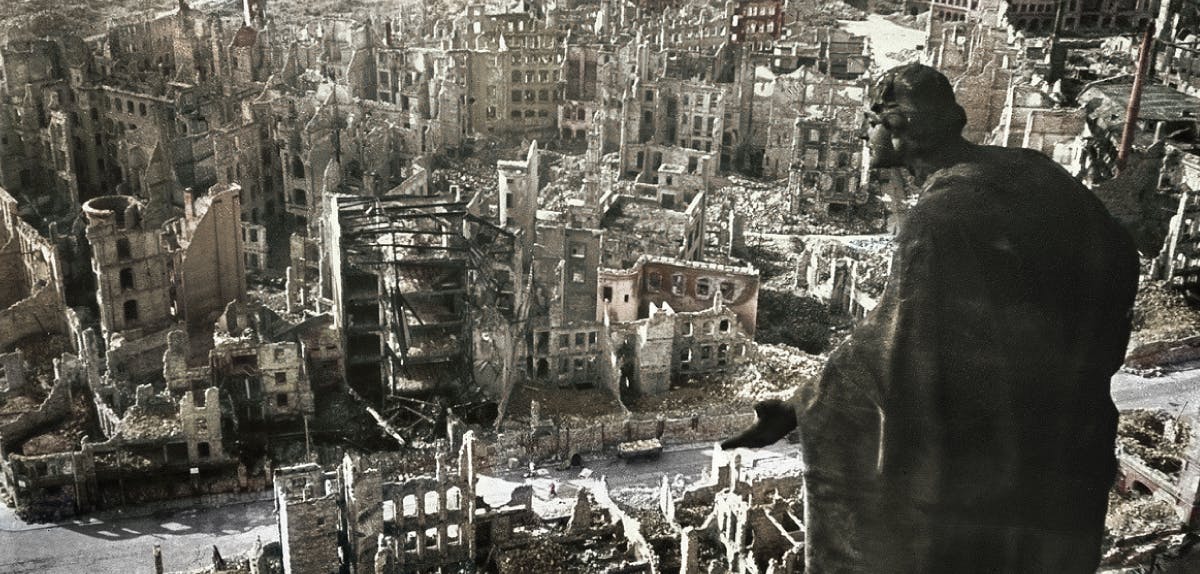Article | Is Israel’s approach toward dismantling Hamas ‘over the top’?
March 1st, 2024

The ruins of Dresden in 1945. Facing south from the town hall ('Rathaus') tower. Photo some time between 17 September 1945 and 31 December 1945 (CC Deutsche Fotothek via Wikimedia)
Article by Rabbi Alan Silverstein, Ph.D. MERCAZ Olami, President
Joe Biden and Anthony Blinken have accused Israel of “indiscriminate” bombing of Gazan cities, a violation of international law. Biden has condemned the Israeli self-defense war effort as “over the top,” unacceptable, Blinken insists that Israeli soldiers are illegally “humiliating” the civilian population of the Gaza Strip. Biden and Blinken have found willing allies in the media. As but one example, a front-page story in the January 2 issue of “The Wall Street Journal” was titled “Gaza’s Destruction Stands Out in Modern History.” It asserts that Israel’s war in the Gaza Strip “is generating destruction comparable in scale to the most devastating urban warfare in the modern record.”
Is this true?
Let’s examine the IDF’s effort at effecting regime change for the Gaza Strip. Seeking regime change means that Israel has jettisoned yet another ceasefire. Why? Time and again since the Hamas’s takeover of Gaza in 2006 a ceasefire has ended in renewed acts of terror. There was a ceasefire in place on October 6! If a ceasefire once again is in place, Hamas has vowed to repeat October 7 “a second time, a third time, a fourth time,” until Medinat Yisrael is destroyed! This time the plan is not only to unleash a pogrom on Israel’s southern border but all over the country, Hamas official Ali Baraka told TV on January 26, “[we] stormed the Gaza envelop and tomorrow [we]… will storm the Galilee…storm Israel from wherever [we].. can.”
Have democracies — notably England and America — engaged in regime change?
As the tide of World War II shifted toward an Allied victory, the British and American military forces realized that military victory alone would not yield a lasting peace. They pursued regime change, the “denazification” of Germany and the cleansing of Japan of its “imperial” regime. Not to do so would have meant temporary victory yet a not-too-distant repetition of violent conflict.
Similarly, the Allies engaged in the removal of Al-Qaeda and the Taliban in a “War on Terror” following the assault of 9/11. A decade and a half later, Allied combat forces militarily removed ISIS from power.
Have the Allies’ regime change efforts faced the moral dilemma of collateral damage [deaths of non-combatants]?
Rabbi Shlomo Brody’s new volume, “The Ethics of Our Fighters: A Jewish View on War and Morality,” devotes a chapter to the World War II bombing of Dresden and other German cities by the British and American air forces. With Israel’s war against Hamas as a backdrop, Brody notes, “To get some perspective, 350,000 German civilians are estimated to have been killed from all Allied air raids.”
Brody also addresses the Allies vs. Japanese combat zones with hundreds of thousands of civilian deaths. What was the rationale? Brody reflects that “many historians argue that had the war extended longer, ‘many more people of all nations — and especially Japan — would have lost their lives than perished in Hiroshima and Nagasaki.'” For example, in the brutal battle over Okinawa — two months before American nuclear weapons were employed — “roughly 240,000 people on both sides were killed.”
Moral anguish was reflected in wartime sentiments. In 1942, Dr. Cyril Garbett, archbishop of York, wrote:
“Often in life there is no clear choice between absolute right and wrong… [rather] the lesser of two evils; and it is a lesser evil to bomb a war-loving Germany than to sacrifice the lives of thousands of our own fellow countrymen who long for peace…”
“The real justification for continuing the bombing is that it will shorten the war, and may save [in the long run] thousands of lives. Those who would demand the suspension of all bombing are advocating a policy which would condemn many more of our soldiers to death…”
In the aftermath of the 9/11 attacks, the “War on Terror” attacked al-Qaeda and the Taliban embedded among civilians. Brown University’s Costs of War Project estimates that hundreds of thousands of people died in the combat zones of Afghanistan, Pakistan, Somalia, and so forth.
The moral dilemma of collateral damage surfaced again in the battle with ISIS. On July 19, 2017, journalist Patrick Cockburn reported that “more than 40,000 civilians were killed in … retaking Mosul [in Iraq] from ISIS… Residents of the besieged city were killed by Iraqi ground forces attempting to force out the militants, as well as by [US] air strikes and by ISIS itself …”
How does the magnitude of the IDF’s collateral damage compare?
The IDF had earned a reputation of minimizing collateral damage. As Dennis Ross wrote, [During the Obama Administration] “General Martin Dempsey, chairman of the Joint Chiefs of Staff spoke of how much the United States had to learn from the Israeli effort to limit civilian casualties during the Gaza conflict [2014].”
Amid the current war of 2023-2024, the IDF estimates having killed 12,000 Hamas terrorists. The Hamas propaganda Health Ministry speaks of 29,000+ deaths. This means an additional 17,000+ Gazans beyond the IDF figures. Ideally no noncombatant should die. This number of deaths is very lamentable but is far fewer than has been the case in American/British. combat campaigns for regime change.
Importantly, not all of these 17,000+ Gazan fatalities resulted from Israeli actions. Some were due to the misfiring of an estimated 30% of Hamas and Islamic Jihad attack missiles. Some were a result of natural causes during a four-month war among a population of 2.3 million. Some deceased residents were murdered by Hamas for “disobeying orders” in wartime. Distortion of these numbers also is caused by Hamas terrorists dressing in civilian attire.
Additionally, Hamas exaggerates the numbers of women and children among the fatalities and implies that all of them are noncombatants. Yet Hamas trains and activates women and teenagers for firing missiles, ambushing soldiers, building terror tunnels, and other acts of combat. Lamentably, some noncombatant civilians have been killed by Israeli fire. But most of them perished due to being used as human shields for Hamas, a violation of international law.
Ambassador Michael Oren writes that “according to “The New York Times,” “The Boston Globe,” and The Watson Institute of Brown University, in America’s wars in Syria, Iraq, and Afghanistan, the ratio was four civilians killed for every combatant.” Israel’s ratio is 1.5:1.
Does the IDF take special precautions to minimize collateral damage?
Admiral John Kirby, coordinator for Strategic Communications at the National Security Council in the White House, told the press that we see Israel repeatedly “take[s] actions … that I’m not even sure our own military would take, in terms of informing civilian populations ahead of operations where to go, where not to go.”
Writing from Israel’s war front, Colonel Richard Kemp, former commander of British forces in Afghanistan, took note of the moral basis of Israel’s tactics. The IDF is taking “all reasonable measures to achieve its mission while minimizing harm to the civilian population and while maximizing humanitarian relief.”
He specifies:
- “selection of [specialized] munitions to achieve the necessary effect on enemy targets while reducing the prospects of civilian casualties”
- “airdropping 6 million leaflets warning civilians to leave specified areas and indicating places of greater safety”
- “14 million pre-recorded phone calls and 72,000 personal calls warning civilians to leave targeted areas”
- “monitoring target areas from air and ground to confirm the departure of civilians where possible before striking”
Michael Oren, former Israeli ambassador to the United States adds that:
- “far from being indiscriminate, each air strike in Gaza must be approved by IDF intelligence and legal officers to assure the minimal impact on civilians”
And John Spencer, a retired US Army officer, researcher of urban warfare, and author, notes additional IDF efforts:
- “[The IDF] provided days and then weeks of warning, as well as time for civilians to evacuate multiple cities in northern Gaza before starting the main air-ground attack of urban areas”
- “roof-knocking, where they drop small munitions on the roof of a building notifying everyone to evacuate the building before a strike”
- “daily four-hour pauses over multiple consecutive days of the war to allow civilians to leave active combat zones”
Spencer emphasizes that “no military had ever implemented any of these practices in war before.”
Additionally, tactical experts point to the Israeli army’s shift in strategy in order to spare Gaza civilians. As observed by a “New York Post” editorial of January 24, “Rather than wage wide-scale aerial bombings, the IDF is relying on ground attacks, more narrowly targeted, to dig out Hamas terrorists.” This approach means that the IDF is encountering a larger number of Israeli casualties.
In early February, “The New York Times” reported that “the daily death toll in Gaza has more than halved in the past month.” Attorney Alan Dershowitz added that the rate of civilian deaths “has fallen almost two-thirds since late October [and] the percentage of civilian-to-combatant casualties has gone down considerably as well.”
Conclusions
All of the efforts made by the IDF to minimize collateral damage are even more remarkable given the daunting nature of its military challenge, John Spencer points out that “Mosul [for US, Britain, and their allies] was one battle in one city against 3-5 thousand militants with limited defenses. Israel is fighting multiple battles in 7 cities against 30,000 militants with military-grade underground cities built under civilian areas.”
Parallel to the Biden/Blinken escalating condemnations of IDF action, US State Department spokesperson Matthew Miller reiterated American foreign policy support for Israel’s objectives. On February 13, Miller stated: “We continue to support Israel’s right to ensure that the October 7 attacks cannot be repeated. We want to see them have the ability to go after Hamas, to defeat Hamas. We know that Hamas wants to continue to target Israel [to repeat October 7 atrocities]…. They are committed to the full-scale destruction of Israel.”
Regime change is essential in Gaza. Israel like any other sovereign, democratic state, cannot exist under a permanent existential threat. Relentlessly violent regimes — like the Nazis, Imperial Japan, al-Qaeda, ISIS, Hamas — must be eliminated so that enduring peace can prevail. In the words of Colonel Richard Kemp: “It’s as simple as that.”
Originally published on The Times of Israel




